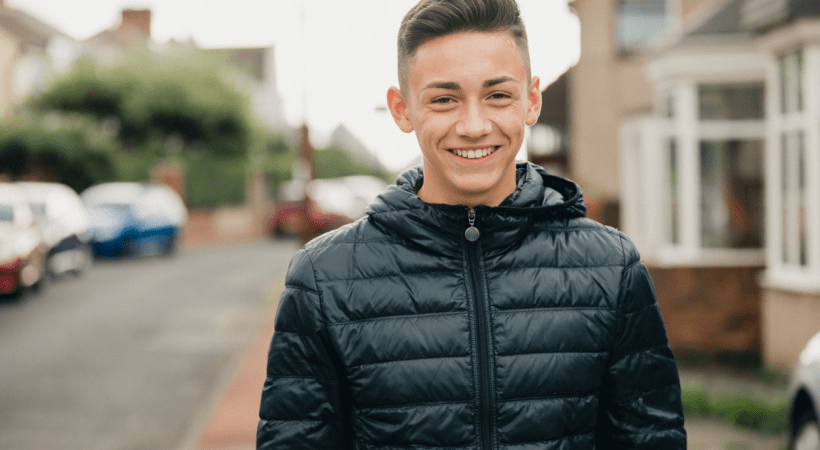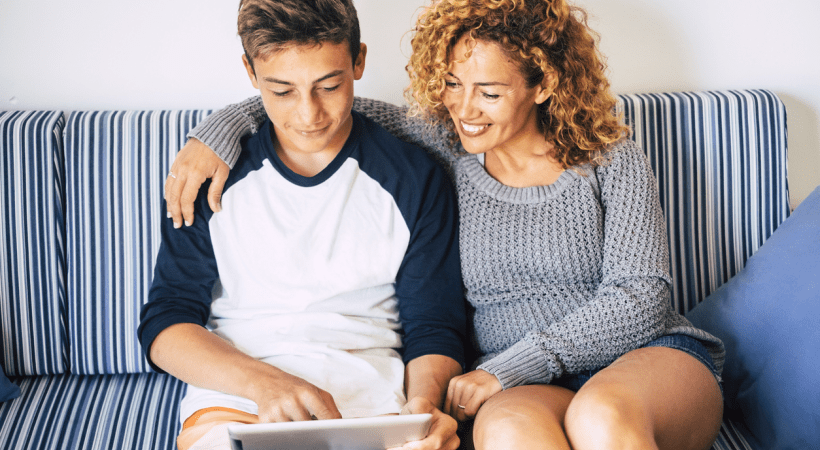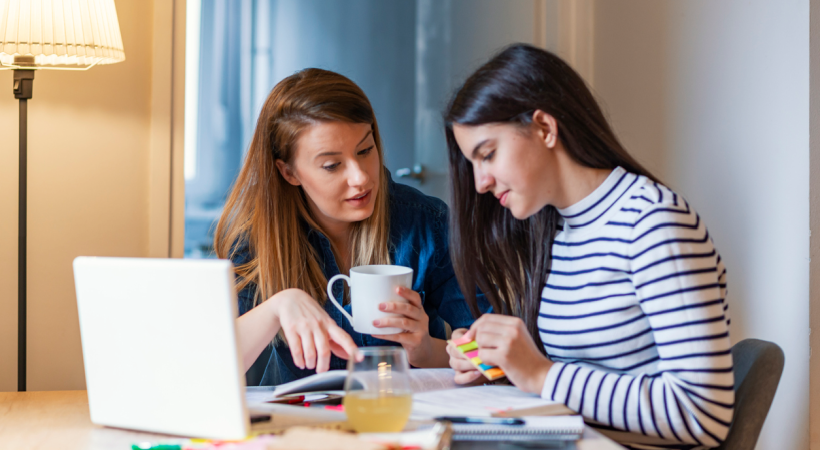An introduction to body image

Body image is how someone thinks and feels about themselves physically. A person has a healthy body image if they feel happy or satisfied with their body, but it’s not always as simple as that.
The onset of puberty can cause teenagers to become more aware of the way they look, and become more anxious about it, due to all the new hormones the body releases as a young person develops. Their body will change, and they may develop body odour and spots. They’ll go through mood swings and low self-esteem, and in more serious cases they may become aggressive or experience depression.
- Puberty begins when part of the brain called the hypothalamus starts producing gonadotropin-releasing hormone (GnRH).
- GnRH prompts the pituitary gland to release Follicle Stimulating Hormone (FSH) and Luteinizing Hormone (LH).
- FSH and LH travel through the blood to the testicles and ovaries, which trigger various developments that will result in maturity.
Influences on teenagers today
As well as all the hormonal changes in their bodies, teenagers also have to cope with outside pressures. While some of these are similar for everyone, many of the difficulties facing today’s teenagers are unique to their generation.
Social media
The swift rise of social media has changed the way young people – and people in general – communicate with each other. It’s easy to stay online at all hours of the day. And rather than going out of the house to see their friends, teenagers can stay connected via WhatsApp, Instagram, Snapchat and TikTok. This means they’re learning communication from behind a screen, rather than becoming familiar with social cues like body language, facial expressions and verbal reactions.
If a teenager doesn’t get enough practice relating to people in real-time, there’s a risk that they will find talking to others face-to-face more difficult when they’re older. They need to be able to deal with more serious situations, such as employment.
However, it’s important to remember that being accepted by peers is a significant aspect of teenage life. Social media is part of this, and it can feel incredibly serious, especially when data such as likes, comments and shares are considered to be measures of popularity and likeability.
Teenagers can spend a lot of time deciding how they want to present themselves and comparing themselves to their classmates which can fuel negative body image concerns.
Social media has also been linked to negative body image and low self-esteem, although whether this is a cause, or a correlation is up for debate. In 2017, the Royal Society for Public Health published a report called #StatusOfMind, which examined the positive and negative effects of social media on young people’s health. Some of the findings include:
- 91% of 16-24-year-olds use the internet for social media, compared to 51% of 55-64 year-olds and 23% of people aged 65+
- Social media use is linked with increased rates of anxiety, depression and poor sleep
- Lots of young people have issues with body image, but it’s a more common problem for girls and young women, with 9 in 10 teenage girls saying they are unhappy with their body
- Past studies have shown that even if young girls and women view Facebook for a short period of time, their body image concerns are higher compared to non-users
- One study saw girls more likely to want to change their appearance after spending time on Facebook
- Although there has been more discussion around the images of women and girls we see in the media, including social media, there has been comparatively less research into the impact of social media on young people with regards to body image
Additionally, when the Royal Society for Public Health surveyed 14-24-year-olds about how social media affected their wellbeing, they found that it wasn’t just Facebook which had a negative impact on body image. Twitter, Instagram and Snapchat also had an effect. Instagram was ranked as the most negative platform when the respondents were asked to rate the five most popular platforms. Perhaps this is not surprising, given that Instagram is based around the sharing of photographs.
However, there were also some more encouraging findings in the #StatusOfMind report:
- Social media can improve teenagers’ access to information about health, including from experts.
- Those who use social media reported being more emotionally supported by their contacts.
By learning about the experiences of others, teenagers can relate them to their own lives, and may even find that someone else’s coping strategies help them too. Content from qualified, credible experts can improve their understanding of health issues, including body image, and guide them in making the right choices when looking after themselves. It can also give them the vocabulary to describe what they are going through if they need to see a GP.
Making social media rules for teenagers
Part of raising a teenager is letting them make and learn from their mistakes. But they’re not quite adults, so it’s still important to set boundaries and be involved with their social media use. If you’re open with them, they are more likely to be open with you in return, instead of rebelling or hiding things in case they’re punished.
There is also a chance that your teen has multiple accounts (one for friends and one for family) therefore be mindful that you may not be seeing the full picture.
Fear of missing out (FOMO)
Fear of missing out, is the worry that other people are enjoying themselves at social events you’re not at, resulting in feelings of inadequacy.
It can be enhanced by social media when others share updates about what they’ve been doing. Those experiencing FOMO may constantly be refreshing social media pages to see what their contacts are sharing, even if it makes them feel worse. The idea that they’re not attending the popular social events may cause them to feel inadequate when compared to their peers.
Teenagers are always going to make comparisons – it’s human nature. And social media gives them more chances to compare themselves. It’s easy to forget that social media can be filtered and photoshopped into a highlight reel when you’re already feeling bad about yourself and the way you look.
Cyberbullying
Another danger of communicating through a screen, rather than face-to-face, is that it is easier to make nasty comments. Cyberbullying is a growing problem, with 7 in 10 young people saying they have experienced it.
Some people are emboldened by the lack of direct contact, and this can lead to cyberbullying – including amongst teenagers. The language used can be more extreme than it would be in real life, and so the nuances of a disagreement are often lost.
Girls may be more at risk of cyberbullying, both in terms of being the bully and the bullied. They are conditioned to compare themselves to others, especially other girls, and especially in terms of the way they look. This increases the chances of developing poor body image, and they may lash out at others as a result of their own insecurities. Often, criticising others is a way to make ourselves feel better.
Body image advice

You can’t wrap your child up in cotton wool and protect them from every difficulty, as much as you might want to. But you can keep an open dialogue about body image and give them advice and encouragement.
Self-acceptance
No one is perfect, despite what filters and Photoshop might have us all believe. Remind your teenager of this if they start to point out what they perceive to be “flaws” with the way they look. You can also give them these tips:
- Instead of pointing out something you don’t like about your body, find something you do.
- Keep a list of things you like about yourself that aren’t about the way you look, such as being a good friend.
- Focus on what your body is capable of: your body can walk, run, stretch and breathe. You might be a great swimmer or dancer. Our bodies do hundreds of things without us having to think about it – there’s a lot to be grateful for.
- Notice how your body feels. What is it telling you? Do you need to eat or drink? Do you need to sleep? The more you pay attention to it, the better you’ll become at knowing what you need.
Tips for positive body image
- Remember that most people are so busy worrying about themselves that they don’t notice you as much as you think they do.
- Remind yourself that you’re a whole person, not just a body.
- Surround yourself with good friends who are supportive and don’t put you down.
- Wear clothes that you like and that you feel comfortable in.
- Remember that most images online, on social media and in adverts have been edited. The people in those pictures don’t always look like that.
- Treat yourself with kindness. Do nice things for yourself.
- Don’t make harsh comments about the way you look. Imagine you’re talking to a friend or someone you love.
How to help your teenager take care of themselves
Part of being a teenager is gaining more independence as you get older and part of this involves being taught how to look after yourself. You will be the best judge of when they are ready for new responsibilities and can advise and encourage your teen as they learn to do more things for themselves.
Food
A balanced diet gives you more energy and keeps your body healthy, which in turn will make your teenager (and your whole family) feel better. Adolescents need three nutritious meals a day, with five portions of fruits and vegetables, plus plenty of calcium, iron and vitamin D.
They may also want to snack. We’re often more tired and irritable when we’re hungry, so eating regularly can help to regulate mood and energy levels. Treats like fizzy drinks and chocolate bars are okay in moderation.
Activity
Exercise causes the body to release endorphins. Endorphins are released from neurons when we experience stress, but exercise increases their production. Since endorphins have been described as the body’s natural painkillers, this can improve your mood and overall wellbeing.
Exercise also:
- Builds strength
- Improves fitness levels
- Improves sleep quality
- Offers a way to channel anger and frustration
- Can be good for your mental health
Encourage your teenager to do something active. They may already have a hobby they’ve enjoyed since they were little, such as football or dancing, or they may not know where to start. You could look into a gym membership, classes like yoga, and pilates, or team sports like football and hockey. They’re more likely to keep it up if it’s something they enjoy.
Sleep
Don’t underestimate the importance of sleep. A good night’s sleep is linked to better concentration, lower levels of stress, a better immune system and improved mental wellbeing.
The NHS recommends a minimum of eight to nine hours of sleep on school nights for teenagers, although research shows that teenagers need more than nine hours of sleep per night. The natural times for waking up and going to sleep get later until you reach the age of 20, which is why teenagers find it so difficult to get up in the morning. The school day is not structured around their biological body clock.
Here’s how you can help your teen:
- Don’t let them keep a mobile, tablet, laptop or games console in their bedroom at night – the light from screens sends signals to the brain that it needs to be awake.
- Encourage them to have a minimum of 30 minutes of time with no devices before they go to bed.
- Suggest that they stop drinking caffeinated drinks at least four hours before they plan to go to sleep.
- Buy them a proper alarm clock to use for waking up in the morning.
- Consider installing blackout curtains or a blackout blind. If you worry that this will make waking up more difficult, you can find alarm clocks which come with a light that comes on gradually each morning.
Hygiene
Many teenagers develop body odour when they start going through puberty, which can lower their self-esteem. A simple routine can help them feel fresh, and minimise the effect of odour:
- Encourage them to shower once a day, and after they finish exercising.
- They may need to wash their hair more regularly than before due to the skin producing more sebum, including on the scalp.
- If they prefer to shower in the morning, they should apply an anti-perspirant afterwards. It’s a good idea to buy them a mini version to carry in their bag, so they can freshen up throughout the day.
Skincare
Many teenagers will get spots, which can contribute towards negative body image. Adolescent breakouts are often thought to be caused by the increased levels of the hormone testosterone that are released when a young person goes through puberty. Testosterone encourages the sebaceous glands near the surface of the skin to start producing extra sebum.
We need a certain amount of sebum to keep the skin lubricated, but if there’s too much it mixes with dead skin cells and plugs the follicles (the tiny holes in the skin) forming spots. If the plugged follicle is close to the surface of the skin, it bulges outwards, creating a whitehead. Alternatively, the plugged follicle can be open to the skin, creating a blackhead.
Normally harmless bacteria that live on the skin can then contaminate and infect the plugged follicles, causing acne papules, pustules, nodules or cysts. These develop deep under the skin, creating red, inflamed sore bumps which are painful to the touch.
Acne and spots can be frustrating. However, skin can be calmed down with a skincare routine. Teens should wash their face once in the morning and once in the evening. This should also be done after exercise to clean away the bacteria in sweat. They can follow this with an acne treatment and an oil free moisturiser if required.
Some teenagers may want to see a doctor if their acne is painful or significantly affecting their confidence. They can prescribe antibiotics, topical acne treatments and, for girls, the combined oral contraceptive pill. In severe cases, they can refer you to a dermatologist.
How to talk about body image with your teenager

How to start the conversation
Sometimes a conversation is needed; but being too direct can have the opposite effect you want – teenagers can become very quiet, or they may react as if a straightforward question is an outrageous demand.
However, it’s important to keep communication open. Sometimes, the fact that they know you’ll always be there is enough. You can learn a lot if you take a step back and listen to them, without prying too much.
Be willing to answer any questions they have about body image and pay attention to their answers. It’s tempting to downplay their worries, but teenagers want to be trusted and taken seriously. Show them that you understand their concerns.
Setting a positive example
Not all communication is verbal. Children learn a lot of their behaviour from their parents, and attitudes towards body image are no exception. Take care not to refer to your own body in a negative way or make negative comments about others. Focus on everyone – including your teenager – as a whole person, rather than commenting on their looks.
Warning signs

Most teenagers (and most people) have something they don’t like about their body. But there’s a difference between a slight dislike and a fixation. Here’s what to watch out for in your teen:
- Self-criticisms
- Constant comparison to others
- Obsessing about their weight or body shape
- Changes in mood, behaviour, energy or appetite
- No interest in activities that used to make them happy
- Isolating themselves
Changes are normal throughout adolescence, due to how fast they are growing. If any of these affect their ability to go about their normal routine, they may need your help. They may also need to talk to a GP or mental health professional.
What you can do if they’re struggling
First, listen to their worries without judgment. Teenagers are more likely to open up to their parents if they know they won’t be dismissive. Make sure they know that there’s no right or wrong way to look, despite what the media might suggest.
Talk to them about their concerns and offer reassurance where you can. If this doesn’t help, it’s time to see a doctor.
Getting professional help
If your teen feels like they can’t cope with their feelings about body image, they can talk to their general practitioner (GP).
During the appointment, the GP will give professional advice, make a diagnosis, and direct you and your teen to local services and support groups. They can also recommend treatment and refer you to a specialist if needed (for example, if they think your teenager has an eating disorder).
There are some steps you and your teenager can take to make the appointment easier. They may find it easier to write down what they want to say. Things that will help their GP understand how they’ve been feeling are:
- When they first noticed any negative feelings about body image
- How they think and feel about their body
- How these thoughts and feelings affect their behaviour (do they avoid activities they used to love because of their body image?)
- How it affects their day-to-day life
You can also write down the questions you both want to ask.
Useful links
Information and advice
Youth Access
Advice and counselling network for young people aged 12-25. You can use their search engine to find free counselling services and other support networks in your local area.
The NHS website
Explains everything that happens to boys and girls when they go through puberty.
Messaging services
The Mix
A free talking service for young people under the age of 25. Choose from a phone call (0808 808 4994), email conversion or web chat.
YoungMinds Crisis Messenger
A 24/7 text service that young people can use if they are going through a mental health crisis. Texts are answered by trained volunteers and they are supported by clinical supervisors. The service is free from BT Mobile, EE, GiffGaff, Three, O2, Telecom Plus, Tesco Mobile, Virgin Mobile and Vodafone.
Help with eating disorders
Anorexia and Bulimia Care
A helpline (03000 11 12 13) that people with eating disorders can use for support (option 1) or their family and friends can use for information (option 2).
B-eat
Offers support for people who have eating disorders and their families. They have an email address (fyp@b-eat.co.uk) and a helpline for under 25s (0808 801 0711).